Project management is one of those terms that is banded around the sector as just part of everyone’s role. Whether you’re an events fundraiser, a major donor fundraiser or a database manager and its true there is project management that helps all of the people in those roles succeed, but most times its silo’d. There’s no cross team working unless its writing a piece for comms or digital to help promote the cause or event.
I find a lot of charities think that the project management of a new CRM system is something that can be “tacked on” to someone’s day job not realising the amount of effort required and communication skills needed at all levels within the organisation as well as talking to vendors and potentially other contractors to do the things that you need.
I do a lot of project management as part of my implementation roles and always find it interesting the perception of what “good” looks like. I always say when starting projects that you will start off liking me, you’ll get to UAT and be a little bit overwhelmed and then once you see how a will change your work be on the happy curve again.
But essentially, CRM project management is about a journey. Most people who are implementing a new CRM system are either doing it and not wanting to change or excited about the change and the new possibilities. Wrapped up into this is the change management piece and collaborative working across all teams who will use the new system. In my view this should be everyone who is a touch point with a supporter, from CEO to the receptionist as its really important. All good organisations charity or not base their work/products/service on data as well as other things but data is at the heart or should be.
So back to the difference between day to day project management and CRM implementation project management, a CRM implementation has a lot of moving parts and should have lots of collaboration within the organisation as you define best practice and a common understanding. There’s a lot of potential data sets that will be unearthed that should be in the CRM but never made it for whatever reason and then there’s the cultural change for the organisation.
Like I’ve said previously, the best CRM system in the world is only as good as the people who use it and the data that they put into it. But now more than ever it’s important to ensure that your organisation has one version of the truth.
So with these three things the key is to:
- Know what go live looks like (I personally recommend going live in phases so if you need web/events/volunteering/ as part of go live, when is that going to happen, you probably want to try and stagger how people need to take on that knowledge of the new product
- Understand that people have day jobs, if a project can be delivered in 4 months that’s great but real life will I guarantee get in the way, most of my projects at best go live after 6 months but more realistically end up somewhere closer to 9 months – again the key here is making sure you know what number 1 looks like.
- Communication and collaboration – put time in people’s diaries for show and tell or key business changes, its key in getting buy in and making sure that your users (or even better super users) are on board with how it will work
- Book out time for familiarisation sessions let people play with the product and give them the support that they need. A good project manager is 70% counsellor and 30% doing or managing the doing
- As project manager you don’t have to know how to do everyone’s job, make sure you have key people (Super users / Champions / Heroes / Knowledge Managers / Wizards) whatever you want to call them, they are the people who know their job
- Make sure you share the knowledge, its key in keeping everyone on track, a folder on a server, a group in outlook, a simple project management tool, make sure it forms part of your meetings. It’s key to share this knowledge with the leadership team as well as your Super users and champions
It’s a journey, in my view it’s a fun journey as you come out as a better organisation after you’ve done it, but it is hard work and on top of day jobs can be very frustrating.
I hope that this has helped and if it is a bit overwhelming for you or your team drop us a note and we’ll talk it through with you.
